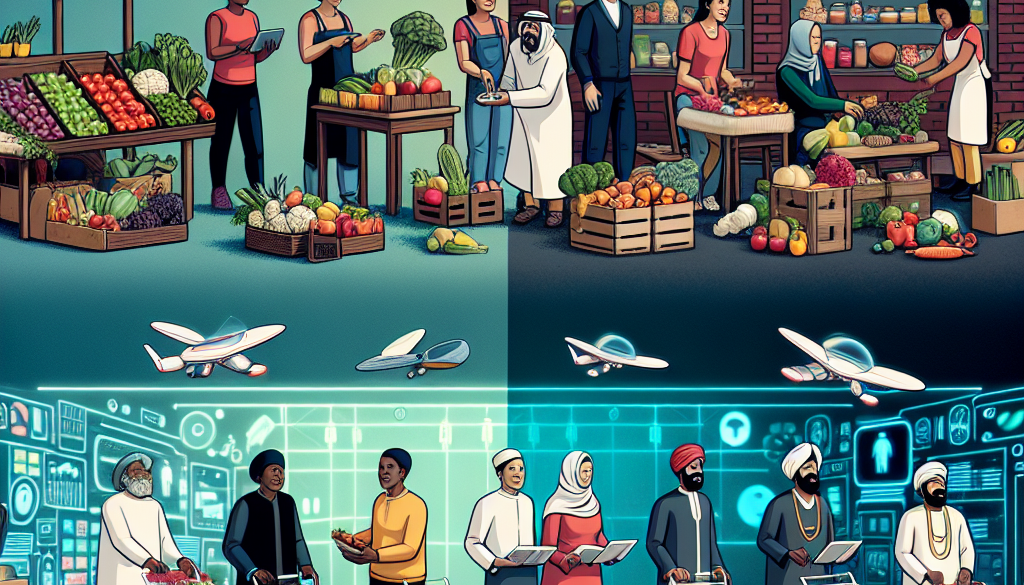Trends in Food Distribution Reshaping the Industry
-
Table of Contents
- Trends in Food Distribution Reshaping the Industry
- Technological Innovations in Food Distribution
- Consumer Preferences Shaping Distribution
- Supply Chain Efficiency and Sustainability
- Direct-to-Consumer Models
- Regulatory Changes and Food Safety
- Conclusion
- ETprotein: Meeting the Demand for High-Quality Protein Products
Trends in Food Distribution Reshaping the Industry

The food distribution industry is undergoing a significant transformation, driven by technological advancements, changing consumer preferences, and the need for more efficient supply chains. These trends are not only reshaping the way food is distributed but also how it is produced, marketed, and consumed. In this article, we will explore the key trends in food distribution that are influencing the industry and how businesses are adapting to these changes.
Technological Innovations in Food Distribution
Technology is at the forefront of the evolution in food distribution. Innovations such as blockchain, the Internet of Things (IoT), and artificial intelligence (AI) are improving traceability, efficiency, and customer service.
- Blockchain: Blockchain technology is enhancing transparency in the food supply chain by providing a secure and immutable ledger for tracking the production, movement, and sale of food products.
- IoT: IoT devices are being used to monitor the condition of food during transport, ensuring that temperature and humidity levels are maintained to prevent spoilage.
- AI: AI is being utilized for demand forecasting and inventory management, helping distributors to reduce waste and ensure that the right products are available at the right time.
Consumer Preferences Shaping Distribution
Consumer demand for convenience, variety, and sustainability is influencing food distribution strategies. Online grocery shopping, meal kit services, and the demand for locally sourced and organic products are examples of consumer trends that are changing the landscape of food distribution.
- Online Grocery Shopping: The rise of e-commerce has led to an increase in online grocery sales, requiring distributors to develop efficient last-mile delivery solutions.
- Meal Kit Services: Meal kit delivery services are growing in popularity, prompting distributors to create specialized logistics solutions for these time-sensitive products.
- Local and Organic: Consumers are increasingly seeking out locally sourced and organic foods, leading to a rise in regional distribution networks and shorter supply chains.
Supply Chain Efficiency and Sustainability
Efficiency and sustainability are becoming critical factors in food distribution. Companies are investing in more efficient transportation methods, reducing food waste, and implementing sustainable practices to meet both regulatory requirements and consumer expectations.
- Transportation: Distributors are using more fuel-efficient vehicles and optimizing delivery routes to reduce carbon emissions and costs.
- Food Waste Reduction: Advanced inventory management systems and improved packaging are helping to minimize food waste throughout the distribution process.
- Sustainable Practices: From sourcing to packaging, distributors are adopting practices that reduce environmental impact, such as using renewable energy and biodegradable materials.
Direct-to-Consumer Models
The direct-to-consumer (D2C) model is gaining traction in the food industry. Producers are bypassing traditional distribution channels to sell directly to consumers, often through online platforms. This trend is empowering small-scale producers and giving consumers access to a wider range of products.
- Online Marketplaces: Platforms like Amazon Fresh and local online farmers’ markets are enabling producers to reach consumers directly.
- Subscription Services: Subscription-based models for products such as coffee, wine, and snacks are allowing consumers to receive regular deliveries from their favorite brands.
Regulatory Changes and Food Safety
Regulations related to food safety and traceability are becoming more stringent, compelling distributors to adapt their processes to comply with new standards. The Food Safety Modernization Act (FSMA) in the United States, for example, has introduced more rigorous safety requirements for food distributors.
- Traceability: Distributors must now ensure that they can trace the origin and movement of food products throughout the supply chain.
- Compliance: Companies are investing in technology and training to meet the latest food safety regulations and avoid costly recalls.
Conclusion
The food distribution industry is experiencing a period of rapid change, with technology, consumer preferences, sustainability, and regulatory pressures driving innovation. Distributors that embrace these trends and adapt their business models accordingly will be well-positioned to succeed in the evolving marketplace. By leveraging technological advancements, responding to consumer demands, improving supply chain efficiency, and ensuring food safety, the industry can look forward to a future that is both profitable and sustainable.
ETprotein: Meeting the Demand for High-Quality Protein Products
In line with the trends of health consciousness and sustainability, ETprotein is a company that stands out for its commitment to providing high-quality protein products. Their extensive range of organic bulk vegan proteins and L-(+)-Ergothioneine (EGT) caters to the growing demand for plant-based and allergen-free options in the food and beverage industry.
ETprotein’s offerings, which include a variety of protein powders and EGT grades, are ideal for businesses looking to innovate in the food distribution space. Their products are characterized by a neutral taste and high purity, making them suitable for a wide range of applications, from sports nutrition to health and wellness products.
As the industry continues to evolve, ETprotein’s dedication to quality, sustainability, and customer service makes them a valuable partner for food distributors looking to stay ahead of the curve.
About ETprotein:
ETprotein, a reputable protein and L-(+)-Ergothioneine (EGT) Chinese factory manufacturer and supplier, is renowned for producing, stocking, exporting, and delivering the highest quality organic bulk vegan proteins and L-(+)-Ergothioneine. They include Organic rice protein, clear rice protein, pea protein, clear pea protein, watermelon seed protein, pumpkin seed protein, sunflower seed protein, mung bean protein, peanut protein, and L-(+)-Ergothioneine EGT Pharmaceutical grade, L-(+)-Ergothioneine EGT food grade, L-(+)-Ergothioneine EGT cosmetic grade, L-(+)-Ergothioneine EGT reference grade and L-(+)-Ergothioneine EGT standard. Their offerings, characterized by a neutral taste, non-GMO, allergen-free attributes, with L-(+)-Ergothioneine purity over 98%, 99%, cater to a diverse range of industries. They serve nutraceutical, pharmaceutical, cosmeceutical, veterinary, as well as food and beverage finished product distributors, traders, and manufacturers across Europe, USA, Canada, Australia, Thailand, Japan, Korea, Brazil, and Chile, among others.
ETprotein specialization includes exporting and delivering tailor-made protein powder and finished nutritional supplements. Their extensive product range covers sectors like Food and Beverage, Sports Nutrition, Weight Management, Dietary Supplements, Health and Wellness Products, and Infant Formula, ensuring comprehensive solutions to meet all your protein needs.
As a trusted company by leading global food and beverage brands and Fortune 500 companies, ETprotein reinforces China’s reputation in the global arena. For more information or to sample their products, please contact them and email sales(at)ETprotein.com today.












